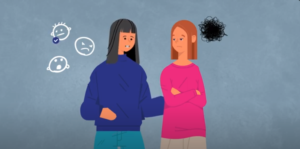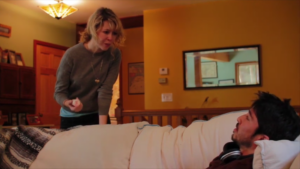Videos
When A Loved One Refuses Treatment (LEAP Approach)
Struggling with a loved one who refuses treatment? Discover the LEAP (Listen, Empathize, Agree, Partner®) approach developed by Dr. Xavier Amador. This video guides you through the key steps to building trust and cooperation, even when faced with resistance. Learn how to effectively communicate and support your loved one using proven strategies.
TEDx - Orient Harbor
While studying to become a clinical psychologist, Dr. Xavier Amador had a life-altering experience when his older brother was diagnosed with schizophrenia. In an effort to understand and help his brother, he and his colleagues at Colombia University uncovered a new way to approach patients previously thought to be in denial.
LEAP vs. The Usual Approach when Offering Treatment
Watch Dr. Amador use LEAP to offer a Long Acting Injectable (LAI) antipsychotic medication. Based on an actual offer of an LAI to one of his patients, Dr. Amador offers a LAI to a young man with serious mental illness who is unaware he is ill–has anosognosia. Dr. Amador contrasts the usual educational approach, to making the offer successfully using LEAP. Very hands-on, helpful, and detailed.
LEAP for Missed Injection of Long Acting Injectable medicine
A phone call when the appointment for an antipsychotic long-acting Injection is missed. Using LEAP reflective Listening, Empathy, Agreement and delay of hurtful opinions to create trust and willingness to make the appointment. The father mentioned does not have a HIPPA release.
Dr. Amador Cambridge Talk on Helping People W/ Mental Illness
Dr. Xavier Amador, founder of The LEAP Institute giving a public talk on how to help people with mental illness who don’t realize they are sick. Sponsored by the NAMI (National Alliance on Mental Illness) Cambridge Chapter. The lecture was given on the evening of October 2, 2012 at the Cambridge Public Library in Cambridge, Massachusetts.
Learn to LEAP Trailer
This video is a trailer for the Learn to LEAP video featuring Dr. Xavier Amador, world-famous expert on schizophrenia.
► You can learn from the LEAP DVD http://bit.ly/1x0RJ24 or Book http://bit.ly/1Bcp8Y9.
Beyond the Glass Ceiling
Dr. Amador talks about the difference between negative and positive symptoms in schizophrenia, and how being aware of, and treating, negative symptoms can give people with schizophrenia a better quality of life, can help them rise beyond the “glass ceiling” where patients often stall in their struggle to regain normal lives.
Making a Difference in the Lives of Patients with Schizophrenia
An excerpt from an educational video about schizophrenia featuring renowned psychologist Xavier Amador. Dr. Amador shares his personal experience of being a caregiver to his brother and shares his thoughts on helping patients achieve better outcomes. Written and produced by Kristin Pelletier, Blue Truck Productions.
I Am Not Sick, I Don't Need Help!® | Schizophrenia: Three Moms in the Trenches
Schizophrenia in the Family. How do we cope? How can we help? We each have adult sons with schizophrenia and have written acclaimed books about it. We say it like it is, to help families, practitioners and those with SMI (serious mental illness) feel less alone…and learn. Randye Kaye, Mindy Greiling, Miriam Feldman…and guests.
Defining and Diagnosing Anosognosia
In the first part of this video series, Lindsay Galvin Rauch, Owner of Event Design Group, interviews Xavier Amador, PhD, Cofounder and CEO, The Henry Amador Center on Anosognosia and the LEAP Institute, on defining and diagnosing anosognosia as it relates to severe mental illnesses, such as schizophrenia.
The Impact of Anosognosia and Noncompliance
In Part 2 of this video series, Lindsay Galvin Rauch, Owner of Event Design Group, and Xavier Amador, PhD, Cofounder and CEO, The Henry Amador Center on Anosognosia and the LEAP Institute, discuss how anosognosia impacts treatment noncompliance and the impact on family dynamics.
Treatment Advocacy Center- Research into Poor Insight and How to Help - Dr. Xavier Amador
Dr. Xavier Amador’s Keynote address at the 2022 National AOT Symposium & Learning Collaborative. **NOTE: due to technical issues with the audio, enabling subtitles for the first 7 minutes of this video may be helpful.
Quand un proche refuse un traitement (approche LEAP)
Vous avez du mal avec un proche qui refuse le traitement ? Découvrez l’approche LEAP (Écouter, Empathiser, Accepter, Partager) développée par le Dr Xavier Amador. Cette courte vidéo explicative vous guide à travers les étapes clés pour instaurer la confiance et la coopération, même face à la résistance. Apprenez à communiquer efficacement et à soutenir votre proche en utilisant des stratégies éprouvées.
HelpGuide.org - Interview with Dr. Xavier Amador
Dr. Xavier Amador shares tips and guidance for family members with mentally ill loved ones who don’t believe they’re sick and refuse to get help. Learn how to support a loved one with schizophrenia, bipolar disorder, or addiction and get them to accept the treatment they need—even if they don’t believe they have a problem.
Podcasts
In this episode, guest host Rachel Star Withers, who lives with schizophrenia, speaks with Dr. Xavier Amador, Founder and President of the LEAP Institute and author of the bestseller “I Am Not Sick, I Don’t Need Help!” Together, they unpack what anosognosia is, why it prevents so many people from accepting help, and how loved ones can build trust and connection instead of conflict.
Dr. Amador recently sat down with Brenda Zane, host of Hopestream, a podcast for parents navigating the complexities of having a child misusing substances and struggling with mental health. They covered a lot of ground, and we’re happy to share the episode with you. You can find Hopestream on all major podcast apps (Apple, Google, Spotify, etc.) or click here to go straight to the episode. Enjoy!
This is the podcast series that will capture the odysseys of those with the most feared illnesses of our time: bipolar disorder, schizophrenia, borderline personality disorder, and severe depression. Unique and astonishing, the stories are nuanced, detailed, and empathic.
Xavier was a senior in college when he got a panicked call from his brother. This was his closest brother, his older brother whom he deeply admired, and he was telling Xavier that he had killed their dad. It would take Xavier nearly a decade to truly repair his relationship with his brother, though not for the reasons you would expect. But in the process, what he discovered would change the entire approach to schizophrenia for him, and then millions of others.
In this interview with Jennifer Cohen, Dr. Amador discusses the communication tools he has developed for assisting people with serious mental illnesses accept treatment, especially those patients who lack insight into their symptoms and disease, the ethics of overriding autonomy, the best ways to share information with clinicians while respecting confidentiality, and meeting the rising rates of mental illness in the US.
In today’s episode of SMI Spotlight, Dr. Xavier Amador is joined by Dr. Marketa Wills, CEO and Medical Director of the American Psychiatric Association (APA). Dr. Wills discusses her career journey, leading her to enter the field of psychiatry and administration. She covers her vision for the upcoming advocacy from the APA, emphasizing the need to decriminalize mental illness. To achieve this decriminalization, she discusses the need for more tools and legal mechanisms to provide treatment for individuals with severe mental illness who may be unable to see their own need for medical intervention. She also speaks to how the APA advocates to address the shortage of psychiatrists nationwide.























